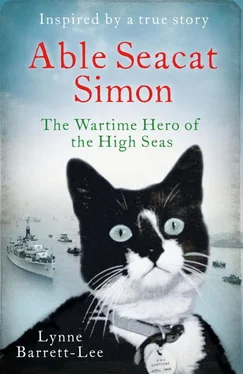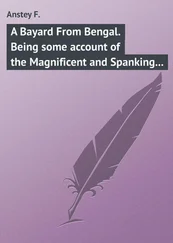He didn’t say any more, but he didn’t need to. I’d been with humans now for long enough to understand them so much better. So I knew; I knew immediately, from the way he said the words to me, and from the way he quickly cast his eyes heavenwards as he spoke. That the Simon in the photograph was gone.
And I realised that the distance between cats and humans wasn’t so great. Whoever that Simon was – and perhaps that didn’t even matter – he was up with my mother, among the stars.
The period immediately after Captain Griffiths left us had been a strange one.
The new captain joined the ship – he was called Lieutenant Commander Bernard Skinner, and he had such a round, smooth and gentle-looking face that I wondered if he’d been one of the boy-sailors in the war – this war that meant nothing to me, but that everyone still seemed to talk about. But though he scarcely looked old enough to command a whole ship, there was something in his manner that seemed to suggest otherwise, something in the way he held himself that put me in mind of some of the cats back on Stonecutters whose territory abutted mine. His was a presence that commanded respect.
I knew it would be some time before we properly got to know each other, but there was good news right away. The first lieutenant assured me that he was a cat lover like Captain Griffiths, which meant my position was probably safe up on the bridge. I hated the idea of giving up my spot on the magnetic compass – not to mention the other spot I enjoyed, in hazy weather: the little box-on-the-wall at the back of the bridge which housed lots of important wires. But I was still keen to make a good impression on the new commander, and immediately set about hunting down a rat to present to him, so he would know I was a cat who pulled my weight.
And there was another change afoot, it seemed. A big one. Within days of Captain Skinner joining us, we celebrated something called Christmas, which was entirely new to me; an odd business that seemed to involve all sorts of peculiar rituals, few of which made a great deal of sense to me (setting fire to your pudding?) and some of which, particularly the things they had appropriately called ‘crackers’, weren’t nice at all. They were terrifying.
Happily, it didn’t last long and, as far as I could tell, the men were rather glad of it all being over, too. After all, though it inspired lots of singing, and a bumper load of extra post when we’d docked at Shanghai, it also inspired a surprising degree of sadness among some of the crew, and, on one unfortunate occasion, following extra rum rations, a leading seaman getting punched on the nose.
But such was the ‘mystery of the human condition’ – a phrase I’d picked up from Captain Griffiths – that, once the ‘festivities’ were done with (along with another bout of bizarre behaviour, to do with ‘seeing in’ the new year, apparently) a collective glumness seemed to settle over the Amethyst, like the sooty spewings of a badly maintained engine.
The rats, in contrast, seemed to be full of the joys of the coming spring; they certainly sprung away with gusto almost every time I got near one, driving me almost to distraction. So it was that I met Captain Skinner before being able to dispatch one to present to him. Instead, I met him quite by accident, a good couple of weeks after he’d assumed command, while keeping Jack company in the wireless room, as usual.
I was taking my rest on some of his Very Important Bits of Paper when the captain appeared, snapping me out of my reverie (about some very important rat-related matters) and making Jack, who had his back to him, jump.
‘Ah, the ship’s cat!’ he boomed, coming in on a cloud of some exotic spicy odour – one that I was fairly sure had not been present on the Amethyst up to now.
He picked me up without further ado (this was clearly the way with captains) setting both my whiskers and nostrils into overdrive all at once.
‘He’s called Simon, sir,’ Jack told him. ‘Well, Blackie, more often that not, sir. One of the ratings found him back last May, sir, on Stonecutters Island. Ordinary Seaman Hickinbottom. Left the ship before Christmas. Mangy little stray, he was. Probably orphaned. Just a kitten then. Nothing of him. Didn’t think he were more than a few months old when he found him. Erm, sir.’
Just as Captain Griffiths had, Captain Skinner now held me at arm’s length for inspection. He had one hand round my tummy, so my front legs dangled over the back of his hand, and the other thoughtfully cupped under my hindquarters. It wasn’t the most dignified position a cat could find itself in, but I’d grown used to the idea that a naval cat needed to be understanding in such situations. I couldn’t expect the captain of one of His Majesty’s frigates to get down on his hands and knees, after all.
The new captain chortled, revealing a row of cheerful teeth. ‘There’s not a great deal of him now !’ he told Jack, as if giving him an order to rethink. ‘Still quite the tiddler, aren’t you, boy?’
‘But he’s an excellent ratter, sir,’ Jack was quick to reassure him.
‘Often the way,’ the captain mused. ‘He’ll be lighter on his feet.’ He brought me back closer to his face then, and I could see he had eyes almost the same colour as my mother had. Warm eyes, like berries. He then put me back down on Jack’s pull-down Morse code machine desk. ‘As you were, old chap,’ he said to me. ‘So now, Signals, what have you got for me?’ and began looking through some of the piles of Very Important Bits of Paper, and various scribbled notes Jack routinely had at his side. And as I settled down to a decent grooming – mangy stray, indeed! – I remembered what Jack had said about ‘when’ I was still a kitten. So I’d been right, then. I’d officially left my kittenhood behind. I was a grown cat not just in my own eyes, but in their eyes as well. I stretched a little taller. Actually felt a little taller. Because it was a quite a milestone, that. I was a cat now. It was official.
I couldn’t help thinking about what my mother had told me about bad luck, and kittens, and cages. I supposed I was now grown enough for that protection to be behind me, which made me even more glad (as if I could have been any gladder) to have been chosen to live the seafaring life.
For there were no men who put cats in cages living here. On board the Amethyst I was free, and I was safe.
And I was safe, and also free, for a long time. We all were. And Captain Skinner turned out to be much like Captain Griffiths – stern when he needed to be, soft when he didn’t, and as appreciative of a dead rat as the next man. Well, assuming the next man was a naval man, anyway.
Captain Skinner was also happy to have a ship’s cat among the company. Though he didn’t whistle for me (and it would be impolite to follow him around without permission), he seemed very happy to have me in the wardroom during meal times, particularly when we had visiting naval dignitaries on board, where he liked most for me to entertain them.
But a ship at sea, previously a warship, as the Amethyst had been, was not always about entertaining visiting dignitaries. Her new role – and her white post-war livery reflected it well – was always to try to help keep the peace.
So when we were given our orders, midway through April 1949, it was odd to begin hearing whispers around the ship that the peace might not be as robust as everyone thought.
Though our orders were, to be fair, perfectly ordinary. Having recently spent a while in Shanghai, and had some fifteen young ratings join us, we were now being sent to relieve our sister ship, HMS Consort , which was stationed in Nanking to provide protection for local British residents, and in particular, the staff of the British Embassy. We were also there to bring supplies to the British and Commonwealth residents and, should they require it (which they apparently might, given China was currently such an unstable country) evacuate any nationals.
Читать дальше












